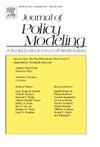模拟全球水资源政策
IF 3.1
2区 经济学
Q1 ECONOMICS
引用次数: 0
摘要
本文通过一种新的全球可计算一般平衡(CGE)模型对不断变化的水可用性进行了分析,该模型超越了现有方法,结合了降水和总储水量(TWS)——一种更全面的水可用性测量方法,包括地表水、地下水和土壤水分。为此,本文首先概述了一般均衡背景下的水经济建模问题,通过对试图将水作为关键经济投入及其对市场和福祉的直接和间接影响处理的CGE模型的回顾。第二,它包括水供应和卫生设施不足对健康的影响,抓住了水供应及其分配影响的一个关键方面。第三,它提供了水如何进入不同价值链的细粒度表示,提供了新颖的建议,并更好地理解了水在各个部门的广泛影响如何可能对气候变化的影响比其他研究估计的更大。利用模拟来评估各种水情景(包括受气候变化影响的情景)下政策不作为的相关成本,为积极的政策干预提供重要指导。本文章由计算机程序翻译,如有差异,请以英文原文为准。
Modelling global water policies
This article develops an analysis of evolving water availability through a novel global Computable General Equilibrium (CGE) model that moves beyond existing approaches by incorporating both precipitation and total water storage (TWS)– a more comprehensive measure of water availability encompassing surface water, groundwater, and soil moisture. To this aim, the article first provides an overview of the problem of economic modelling of water in a general equilibrium context, through a review of CGE models that have attempted to deal with water as a key economic input and its direct and indirect influence on markets and well-being. Secondly, it includes the health effects of inadequate water supply and sanitation (WASH), capturing a key dimension of water availability and its distributional effects. Third, it provides a granular representation of how water enters in the different value chains, providing novel suggestions and a better understanding of how water widespread influence across sectors may contribute to a more significant impact of climate change than estimated by other studies. Simulations are employed to evaluate the costs associated with policy inaction under various water scenarios, including those influenced by climate change, offering crucial guidance for proactive policy interventions.
求助全文
通过发布文献求助,成功后即可免费获取论文全文。
去求助
来源期刊

Journal of Policy Modeling
ECONOMICS-
CiteScore
6.20
自引率
11.40%
发文量
76
期刊介绍:
The Journal of Policy Modeling is published by Elsevier for the Society for Policy Modeling to provide a forum for analysis and debate concerning international policy issues. The journal addresses questions of critical import to the world community as a whole, and it focuses upon the economic, social, and political interdependencies between national and regional systems. This implies concern with international policies for the promotion of a better life for all human beings and, therefore, concentrates on improved methodological underpinnings for dealing with these problems.
 求助内容:
求助内容: 应助结果提醒方式:
应助结果提醒方式:


